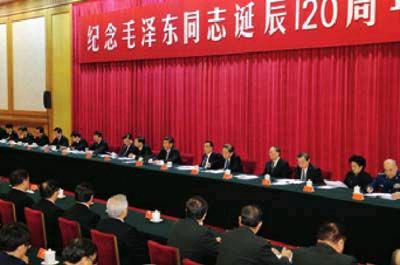Remembering Mao Zedong
2014-02-10ByYuanYuan
By+Yuan+Yuan
Mao Zedong, a man whose name is inseparable with the birth of the Peoples Republic of China (PRC), has long been regarded as a symbol of the Chinese Communist Revolution. Now, his lasting influence has been reaffirmed through his 120th anniversary.
President Xi Jinping, along with other top Chinese leaders, visited the Chairman Mao Zedong Memorial Hall, located at Tiananmen Square in the center of downtown Beijing , on December 26, 2013, which was Maos birthday.
Mao held chairmanship of the Central Committee of the Communist Party of China(CPC) from 1945 until his death on September 9, 1976. He was also Chinas head of state between October 1949 and April 1959.
After the visit, the leaders attended a commemoratory symposium at the Great Hall of the People.
At the symposium, Xi hailed Mao as “a great patriot and national hero” and the core of the first generation of the Chinese leadership. “Mao is a great figure who changed the face of the nation and led the Chinese people toward their new destiny,” said Xi, also General Secretary of the CPC Central Committee.
“Holding high the banner of Mao Zedong Thought should not be compromised at any time, and we will hold that banner high forever,”the president quoted late Chinese leader Deng Xiaoping as saying.
Pervasive influence
Born on December 26, 1893, Mao grew up in a China that faced struggles both outside its borders and within.
After decades of perseverance, Mao and his comrades founded the PRC in 1949, which ended the oppression and aggression by foreign forces and achieved the independence and liberation of the Chinese nation.
Mao Zedong Thought, which emphasizes seeking truth from facts, the “mass line” and independence, is still the long-term guiding principle for CPC governance.
On December 26, people queued up in front of Maos memorial hall in Tiananmen Square. A military officer surnamed Su, who has visited the memorial hall on Maos birthday every year, said, “Each visit has given me new inspirations.”
Several tens of thousands of admirers chose to pay tribute to Mao at his birthplace—Shaoshan in central Chinas Hunan Province. A plain open banquet of longevity noodles and small spicy fish warmed the stomachs and hearts of visitors on December 26.
“The small spicy fish is a must, as it was Chairman Maos favorite ‘taste from home,”according to a villager in Shaoshan who was busy serving the swarms of visitors.endprint
“Theres free food and I feel such a familylike atmosphere here in Maos hometown. Shaoshan touches our generations hearts in its own special way,” said Fan Huiling, a 49-year-old woman who has been looking forward to her trip to Shaoshan for a long time. Setting foot in the village has allowed Fan to realize her lifelong dream of a “personal visit to the birthplace of the great man.”
“Chairman Mao is indeed a great man and his great contributions deserve remembrance from our countrys younger generation,” said Ren Bin, a 22-year-old college student from Xiangtan City, Hunan Province.
It was Rens eighth trip to the village as his parents were also great appreciators of Mao. His mother and father have a collection of Maos poetry and badges.
Across China, a variety of events were held to commemorate Mao around his birthday.
“I dont think there is a geographical, age or social class division in regard to peoples attitude toward Mao,” said Huang Jisu, a sociologist, playwright and cultural critic in Beijing. “He is regarded as one of the most influential and decisive figures in Chinas modern history.”
In Huangs view, the greatest good that Mao did for the nation was the Chinese revolu- tion that he led, which ended the crisis of survival the nation had faced for more than a century.
“Some quotes from Mao are still very popular in China, even among youngsters,” said Wu Bo, a 19-year-old student from Peking University.“Although some young people regard the days of Chairman Mao as the distant past, we cannot deny that his influence still lingers through our parents to us.”
High banner
At the symposium on December 26, 2013, Xi said that the correct historical context must be adopted to appraise a historical figure.
“We cannot use todays conditions, level of development or understanding to judge our predecessors, nor can we expect predecessors to have done the things that only their successors can do,” Xi noted.
Xi said the fact that Mao took detours during the exploration of the path of building socialism cannot be denied, admitting he made “serious mistakes” in his later years, especially during the“cultural revolution” (1966-76).
“Comrade Mao Zedongs mistakes in his later years have their own subjective factors and responsibilities, and complicated social and historical reasons both at home and abroad also played their part,” Xi said. “Without the pros and cons of historical experience gained from practical exploration before the reform and opening up, such processes would not have proceeded so smoothly.”endprint
Mao once summarized the Chinese nations renewal as having two targets: state indepen- dence and national liberation, and a rich people and strong nation.
China met its first target in 1949 after more than 100 years of struggle, and the CPC pledged to achieve their second goal on the 100th anniversary of the founding of the PRC in 2049.
Xi proposed the “Chinese dream,” a concept targeting “the great renewal of the Chinese nation,” shortly after he assumed the top leadership position of the CPC in November 2012.
Today the concept of economic construction has become the central goal of the country, and the reform and openingup policy has taken root deep in the Chinese peoples hearts.
Under the nations new conditions, Party members should adhere to and make good use of the “living soul” of Mao Zedong Thought, namely seeking truth from facts, the “mass line”and independence, according to Xi.
The CPC in June initiated a one-year campaign to strengthen the “mass line,” a guideline under which the CPC is required to prioritize the interests of the people.
When interpreting the doctrine of “seeking truth from facts,” Xi called on Party officials to soberly and correctly grasp the fact that China remains in the primary stage of socialism and will long remain so, and for them uphold truth and correct errors in the interests of the people, as well as advancing theoretical innovation based on practice.
“The country will rely on its own strength for state and national development, maintain national pride and national self-confidence, and unswervingly follow its own path,” Xi said.endprint
